x Headline xxxxx.
2 Around Campus New UGBC leaders; BC Ireland, 25 years along.
x Headline xxx.
3 Welcome Visitors University hosts, and thanks, Margot Connell and her family.
x Headline
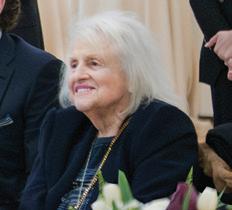
8 BC Arts Faculty poets Shrayer and Weiskott to present new works.
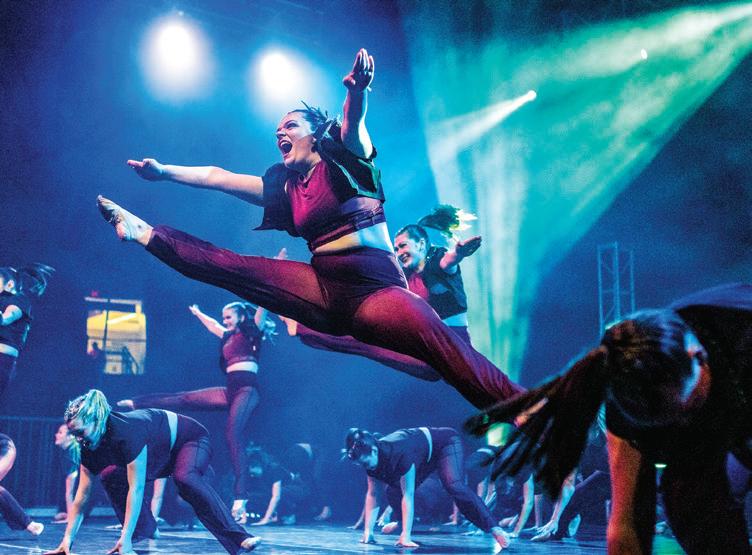
Defending the Constitution
It’s one of America’s foundational documents, so why do so many people seem to dislike or even want to get rid of it? A new book by political scientists Hale and Landy explains that the Constitution is doing what it’s supposed to do.
BY SEAN SMITH CHRONICLE EDITOR
Practically right from the day it was written, the United States Constitution has led a dual existence as one of the country’s most prized documents, and one of its most criticized.
In their new book, Keeping the Republic: A Defense of American Constitutionalism, Professors of Political Science Dennis Hale and Marc Landy examine why the Constitution has come under fire throughout its history, whether from notable statesmen, writers, pundits, and academics or ordinary American citizens—and they explain why that criticism is misplaced.
By and large, the complaints about the Constitution stem from frustration with perceived obstacles to achieving political or legislative aims, say Landy and Hale. Depending on the specific issue, suggested remedies include doing away with the U.S. Senate, the Electoral College, the presidential veto, and/or federalism, or reforming the U.S. Supreme Court to make it more democratic—all of these decried as elements of an obsolete or undemocratic
Constitution that hampers the process of governing.
As the authors note, actions have sometimes replaced words in diminishing or bypassing the Constitution, including by presidents—from Truman embarking on the Korean War without any congressional approval to Reagan’s Iran-contra scandal to Obama’s executive order granting working papers to illegal immigrants, and Biden’s voting reform bill.
Keeping the Republic argues that, by placing effective limits on the exercise of power, the Constitution is simply doing the job it was created to do: providing for a free government. The Constitution is the difference between a country in which the people rule, and one in which people can do anything they want, say Hale and Landy, and the restrictions it sets on American political life is not a problem, but a solution to a problem.
“We felt, based on what we were reading or hearing, that the critics didn’t really understand the Constitution, or more broadly, the idea of a Constitution,” said Hale. “They don’t like the shape and sub-
Continued on page 6

Physicist Aids NASA Research on Asteroid
BY ED HAYWARD STAFF WRITER
Associate Professor of Physics Cyril P. Opeil, SJ, is among a select few scientists who will study asteroid samples as part of an international research effort to shed light on the nature of asteroids, how the planets formed, and how life might have emerged on Earth.
Fr. Opeil is one of the rare researchers with experience studying the low-temperature thermo-physical properties of meteorites
Continued on page 4
“We are delighted to share this approach to ‘whole child education,’ and to bring it to bear on poverty’s impact within Ireland’s high performing school system.”
—City Connects founder Mary Walsh
City Connects Program Will Expand Into Ireland
BY PHIL GLOUDEMANS STAFF WRITER
Boston College’s long tradition of engagement with Ireland will soon experience a growth spurt.
City Connects, the BC-developed school-based intervention system, will officially launch the National Centre for City Connects Ireland (NCCCI) on May 30 at Mary Immaculate College in Limerick, the initiative’s first foreign expansion.
Irish Minister for Education Norma Foley is anticipated to attend and inaugurate the evidence-based program that effectively addresses the out-of-school challenges that directly impact students’ capacity to thrive and achieve within the educational system.
Founded over 20 years ago by Mary E. Walsh, the Lynch School of Education and Human Development-based City Connects has operated domestically in 90
Continued on page 5
QUOTE
Given the issues with forced migration and armed conflict around the world, we are all the more obligated to respond with evidence and bring the tools of disciplines—like implementation science—to strengthen systems holistically.
INSIDE
PUBLISHED BY THE BOSTON COLLEGE OFFICE OF UNIVERSITY COMMUNICATIONS APRIL 25, 2024 VOL. 31 NO. 16
–salem professor in global practice theresa betancourt page 5
photo by caitlin cunningham
Dance Organization of Boston College was among the acts to perform on April 13 in Conte Forum as part of ALC Showdown, the annual showcase for BC student dance groups.
photo by seho lee
Around Campus
New UGBC Leadership Ready to Go
With a campaign slogan of “Forward Together,” Meghan Heckelman ’25 and Katie Garrigan ’25 won an uncontested race for Undergraduate Government of Boston College (UGBC) president and vice president, respectively, and will begin their terms on April 30.
Heckelman, the current UGBC vice president, will succeed outgoing president Jonah Kotzen ’24. She and Garrigan, the current UGBC intersectionality chair, downplayed the fact that they ran unopposed in the April 8 election.
“We’ve been using the past couple of weeks…to lay the foundation and figure out logistics for the transition so that we can spend the bulk of our time on the vision for UGBC, and talking about meeting students where they are,” Heckelman told The Heights.
“We’ve been able to really foster relationships in our organization, so we didn’t have to worry too much about harnessing all those votes, and getting [to] people ahead of
time,” said Garrigan.
Their seven-point platform prioritized formative education, student wellness, diversity, equity, and inclusion, and the Jesuit values to foster a unified campus community through strategic student support and collaborations.
During an April 4 town hall, the duo underscored the importance of intersectionality, and promised to increase support for diversity, equity, and inclusion efforts with the AHANA+ Leadership Council, Queer Leadership Council, and Council for Students with Disabilities.
The new student government leaders stressed that it’s their responsibility to communicate with their fellow students, to understand what their needs are, and how they can support them.
Heckelman, who is majoring in applied psychology at the Lynch School of Education and Human Development with a minor in political science, and Garrigan, an economics major, report that they plan to main-
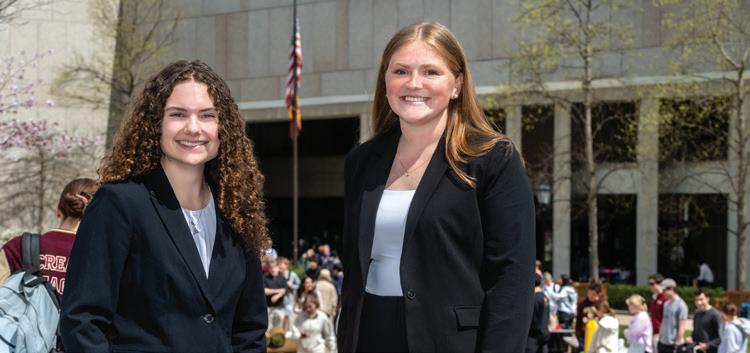
tain the ongoing UGBC Senate initiatives such as laundry subsidies for Montserrat students, possibly underwriting transportation costs for practicums and clinicals, and promoting environmental justice.
“Our approach aims to address student concerns from all cornerstones,” added Garrigan. “A prominent issue our team is looking at is mental health on campus. We are continuing meaningful collaborations
with the Center for Student Wellness and University Counseling Services, fostering support for students from their first year to graduation.”
“We’re incredibly excited to be elected UGBC president and vice president, and to lead our peers, and meet student needs through programming and advocacy work within our administration,” said Heckelman.
—Phil Gloudemans
A Quarter-Century Ago, Boston College Found Its Place in Ireland
Twenty-five years ago this month, Boston College took a major step in strengthening its international presence, and at the same time reinforcing ties with its Irish heritage.
In April of 1999, the University purchased property in the St. Stephen’s Green area of Dublin, in close proximity to the Irish Parliament and other government buildings as well as Trinity College Dublin, the National Concert Hall, National Museum of Ireland, and shopping areas. The 18th-century Georgian building quickly became a locus for Boston College programs, events, and activities, and a resource for BC faculty, staff, students, and alumni visiting Ireland—all under the bailiwick of Boston College Ireland.
“Boston College Ireland is a vibrant place that welcomes students, faculty, and alumni throughout the year and is deeply rooted in Irish academic, cultural, and political life,” said Professor Mike Cronin, the academic director of BC Ireland since 2005.
During the academic year, BC Ireland hosts study-abroad students participating in weekly Irish Studies classes while supporting a cultural program that enables students to optimize their time spent in Ireland. BCI’s summer programs have focused on the fields of business, law, literature, sports, biology, and chemistry, and its summer internship program gives students employment op-
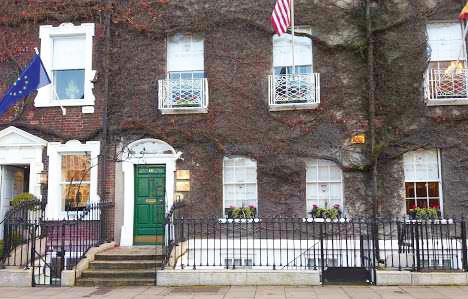
portunities in sectors such as business, government, sports, non-profit, education, and culture.
In addition, BCI has co-organized and co-hosted special events, including alumni holiday gatherings and rallies for BC football games played in Dublin, and more regularly occurring affairs like seminars, book launches, and meetings for a wide range of academic organizations. In December,
BCI was a venue for a four-day celebration of BC’s partnership with Trinity College Dublin, and will help support an annual symposium jointly with the Long Room Hub at Trinity.
BCI’s fruitful relationship with the BC Irish Studies Program has helped initiate a series of large public history programs, exploring topics such as the Irish experience at Gallipoli in World War I, Irish sport-
ing heritage, and the history of the Gaelic Athletic Association. BCI partnered with the Irish government on an online resource, Century Ireland, relating to the momentous years leading to Irish independence.
In addition, BC Ireland has provided administrative or logistical assistance to, among others, the United States Embassy, Ireland’s Department of Foreign Affairs, and the Irish U.S. Alumni Association, a nonprofit voluntary network of alumni of U.S. State Department exchange programs.
With the 25th anniversary of BCI’s formal opening still more than a year away, planning continues for celebrating the milestone, and for the future of BCI.
“It’s very exciting to think about the years ahead,” said Cronin. “One thing that’s clear, based on the first quarter-century of BCI, is how critical the partnerships we’ve formed are to the work we do. We are continuing to promote Boston College as a multifaceted international university that can collaborate and contribute in so many different ways, on an academic or professional basis.
“BC Ireland is more than a name or a building: It’s a very real symbol of the University’s legacy, as an institution created to educate the children of Irish families in Boston.”
—Sean Smith
April 25, 2024
The Boston College Chronicle (USPS 009491), the internal newspaper for faculty and staff, is published biweekly from September to May by Boston College, with editorial offices at the Office of University Communications, 3 Lake Street, Brighton, MA 02135 (617)552-3350. Distributed free to faculty and staff offices and other locations on campus. Periodicals postage paid at Boston, MA and additional mailing offices. POSTMASTER: send address changes to The Boston College Chronicle, Office of University Communications, 3 Lake Street, Brighton, MA 02135. A flipbook edition of Chronicle is available via e-mail. Send requests to chronicle@bc.edu. ASSOCIATE VICE PRESIDENT FOR UNIVERSITY COMMUNICATIONS Jack Dunn SENIOR DIRECTOR FOR UNIVERSITY COMMUNICATIONS Patricia Delaney EDITOR Sean Smith CONTRIBUTING STAFF Phil Gloudemans Ed Hayward Audrey Loyack Rosanne Pellegrini Kathleen Sullivan PHOTOGRAPHERS Caitlin Cunningham Lee Pellegrini www.bc.edu/bcnews chronicle@bc.edu Chronicle
UGBC President Meghan Heckelman, right, and Vice President Katie Garrigan
Boston College Ireland headquarters at St. Stephen’s Green in Dublin.
photo by lee pellegrini
2 Chronicle
Showing Gratitude
Boston College hosts the Connell family, and praises their generosity to the University
BY JACK DUNN ASSOCIATE VICE PRESIDENT FOR UNIVERSITY COMMUNICATIONS
Boston College paid tribute to benefactor Margot Connell H’09 and the Connell family on April 11 with a tour of the Margot Connell Recreation Center and the William F. Connell School of Nursing (CSON), in celebration of the 20th anniversary of the school’s dedication.
Margot and her late husband William (Bill) Connell ’59—who founded Connell Limited Partnership—are recognized as two of the University’s most generous supporters. They both served on the BC Board of Trustees and various capital campaign committees and enthusiastically attended BC Athletics events with their family for more than 40 years. All six of their children and six of their 18 grandchildren attended Boston College, and the couple’s vision and philanthropy enabled both the naming of the top-10 ranked school of nursing and the construction of the popular 244,000 square-foot recreation center that attracts more than 50,000 unique visitors each year.
Margot was joined at the anniversary celebration by her children Monica Cameron Healey ’88, Lisa C. McNamara ’89, Courtenay Connell ’91, BC Trustee William C. Connell ’94, and Terence A. Connell ’02, and five of her grandchildren: Sarah A. McNamara ’16, Ryan Connell, and Eamonn, Paris, and Declan Healey. Following the tours, they attended a dinner reception hosted by University President William P. Leahy, S.J.
CSON Dean Katherine Gregory, who joined Director of Clinical Learning and Simulation Centers Arlene McGuane and
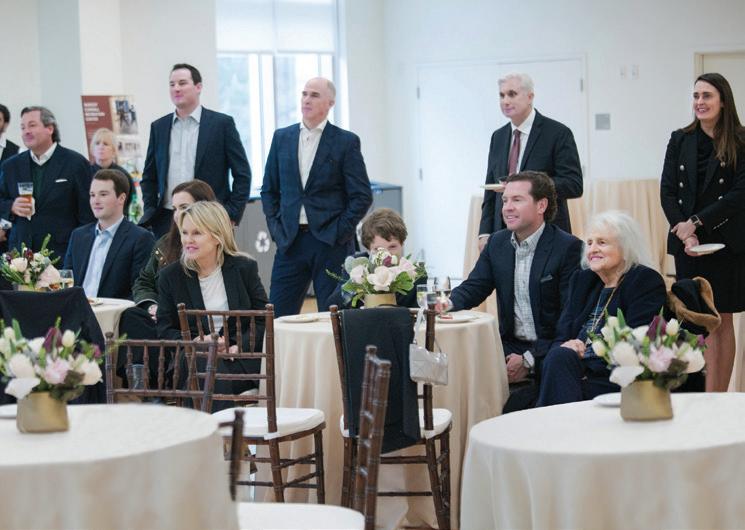
CSON students Caroline Daly ’24 and Johany Jeune ’25 for the simulation lab tour, praised the Connell family for their generosity and unwavering support of the Connell School.
“We are so fortunate to be supported by longstanding relationships with families like the Connell family,” said Gregory. “Their assistance makes our work possible and animates it in ways that we could only have imagined 20 years ago when our school of nursing was named in honor of William F. Connell. Mr. Connell was not only a pillar of our Boston College community, but he was also a grateful patient of BC Nursing.
His gratitude and the ongoing support of his family inspires us to live our mission of ‘Ever to Excel,’ seeking excellence in nursing education and research. BC Nursing—the Connell School of Nursing—is stronger than ever thanks to the Connell family.”
CSON, which earned its top-10 designation among undergraduate nursing programs from US News this fall and saw its Doctor of Nursing Practice program debut at 26th nationwide in March, educates some 440 undergraduate and 340 graduate students annually.
Associate Athletics Director Rebecca Cegledy, who led the tour of the Connell
Recreation Center, thanked Margot Connell for her foresight in helping to envision a facility that fittingly serves a hardworking community of students, faculty, and staff.
“The Margot Connell Recreation Center has had a transformative effect on BC students and the entire campus community since it opened nearly five years ago,” said Cegledy. “At the dedication in 2019, Margot said she hoped the rec center would be a gathering place that offered something for everyone—a place where all students could come to work out, make friends, have fun, and relieve stress. Her gift to the BC community has exceeded all expectations.”
In addition to the benefits of a stateof-the-art facility with an aquatics center, gymnasium for basketball, volleyball, badminton, and fencing, indoor jogging track, tennis courts, spin studio, climbing wall, mind-body studio, and fitness neighborhoods where guests can pursue their own workout routines, the Connell Recreation Center allows Boston College to sponsor intramural sports that now serve more than 11,000 students annually, and club sports that engage 4,600 student participants.
Senior Vice President for University Advancement Andrew Davidson extolled the Connells for their dedication to Boston College and generosity in supporting two of the campus’s most important entities.
“There are few gifts that have had such an important impact on the BC student experience than the dedication of the William F. Connell School of Nursing in honor of Bill Connell and the creation of the Margot Connell Recreation Center in honor of Margot,” said Davidson.
“We are truly grateful to the Connell family for all they have done for Boston College.”
BCSSW to Host Black Mental Health and Wellness Event
The Boston College School of Social Work Black Leadership Initiative (BLI) will host an all-day conference in the Heights Room of Corcoran Commons on April 27, convening social workers, artists, and mental health advocates to discuss culturally responsive strategies for supporting the health and wellness of people in the African diaspora.
Guest speakers at the Black Mental Wellness Symposium will include Jerome Schiele, professor and chair of the doctoral program at Morgan State University School of Social Work; Sean (Truth) Evelyn, a spoken-word artist who works with formerly incarcerated young adults; and Nieisha Deed, the founder and CEO of PureSpark, an organization dedicated to removing the stigma of mental illness in the Black community.
BLI Program Coordinator Lujuana Milton will be among the BCSSW-affiliated speakers at the conference, which was made possible by an $8,000 grant from BC’s Institute for the Liberal Arts. The symposium is free and open to students,
faculty, staff, alumni, and community members.
“Black mental wellness has been significantly impacted by the effects of the historical and generational experiences of many Black people and African Americans, characterized by physical and emotional trauma as well as acts of violence they experience on a daily basis,” said Milton, who played a leading role in organizing the event.
“The Black Mental Wellness Symposium was created to uplift the Black community within Boston College and the Greater Boston area by bringing in presenters to share their knowledge of healing and wellness practices that center the experiences of Black and African American people.”
The focus of the symposium aligns with the mission of the BLI, a cohort-based program that prepares social workers to develop a nuanced understanding of the challenges facing Black communities in Boston and beyond. Students in the program take courses that center the Black experience, complete internships that support the Black community, and participate in
monthly meetings that prioritize both the body and the mind.
BLI co-founders and BCSSW Assistant Professors Samuel Bradley Jr. and Tyrone M. Parchment said that both the symposium and the BLI put a premium on taking an Afrocentric approach to social work practice, focusing on the cultural experiences and values that connect people of African descent.
“The symposium aims to provide participants with a well-rounded perspective on supporting Black communities’ wellbeing,” said Parchment, who studies the behavioral health of families. “Whether they implement it for themselves, their clients, or the communities they serve, this symposium will provide folks with holistic, African-centered, evidence-informed, and life-giving ways of thinking about wellbeing.”
“For so long, pedagogy in social work education has been very focused on methods, models, and tools that have not been culturally appropriate for Black communities,” added Bradley, a researcher of equity
in the workplace. “It’s going to take some time to impact the culture of practice out there, but hopefully this is the start of more to come.”
Full details on the symposium, and a link to register, are available at bit.ly/BCSSW-black-mental-wellness-symposium.
Jason Kornwitz is a senior editor/writer in the Boston College School of Social Work
The symposium will be an opportunity for presenters “to share their knowledge of healing and wellness practices that center the experiences of Black and African American people,” according to a co-organizer.
April 25, 2024
Margot Connell (front right), along with Connell family members, was joined by Boston College administrators and staff members on an April 11 campus tour.
photo by michael manning
3 Chronicle
Fr. Opeil Lends Expertise to NASA Research on Asteroid
Continued from page 1
and asteroid formation. As part of NASA’s historic OSIRIS-REx mission, he has been tasked with conducting experiments on specific heat capacity and determining how a material from the asteroid 101955 Bennu expands and contracts at low temperatures.
Fr. Opeil expects to receive the sample, carefully curated by a NASA team, this spring and begin his experiments.
“For me, it’s a wonderful moment,” said Fr. Opeil. “I think it is a tremendous time for a Boston College physicist, a Jesuit, to be asked to participate in this space mission. This is the first NASA program, similar in scope to the lunar Apollo missions of the 1970s, where an American spacecraft has traveled to a near-Earth asteroid to retrieve sample material. So, it’s a historic moment.”
Launched on September 8, 2016, the OSIRIS-REx (Origins, Spectral Interpretation, Resource Identification, and SecurityRegolith Explorer) spacecraft traveled more than one billion miles to Bennu, classified as a near-Earth asteroid, and collected about 120 grams of rock and dust from its surface on October 20, 2020. The spacecraft spent more than two years on its return journey before it jettisoned a trapezoid–shaped capsule containing the samples that landed in the Utah desert on September 24, 2023. From there the spacecraft continued on to its second mission, called OSIRIS-APEX, during which it will visit and scan the asteroid 99942 Apophis in 2029.
This past fall, while on sabbatical at the Vatican Observatory in Tucson, Ariz., Fr. Opeil was invited by some of his OSIRISREx colleagues to join in the official “watch party” at the University of Arizona as the capsule glided to Earth with the help of two parachutes.
“I would compare it to that moment watching TV when Neil Armstrong first stepped onto the moon,” said Fr. Opeil. “There was a crowd of scientists watching the big screens and they all cheered as the
capsule landed. It was an awesome moment. Some of those researchers had spent the past six to seven years of their lives on this project, hoping the sample capsule would arrive safely. It was a picture-perfect landing. This is the first NASA asteroid sample retrieval and a complete success.”
Fr. Opeil’s involvement in the analysis stems from his earlier work studying meteorites, specifically, those classified as carbonaceous chondrites—formed billions of years ago from a mix of space dust and stony materials, coming together under gravity. As a physicist, he studies meteorites as materials, exploring their thermal and physical properties.
To do that work, his BC lab includes a dilatometer, an instrument used to measure how a material expands as its temperature rises from near absolute zero. He first gained experience using a dilatometer while analyzing uranium compounds and magnetic shape-memory alloys at the Los Alamos National Laboratory in New Mexico as a postdoc of James L. Smith.
In 2020, Fr. Opeil published a paper about his experiments on a group of CM2 chondrite meteorite samples that revealed a surprising result: These materials did not expand and contract uniformly at low temperatures, exhibiting a rare phenomenon called negative thermal expansion. It was the first time negative thermal expansion had been observed in any extraterrestrial material. These findings attracted the attention of astronomers who were awaiting the samples from Bennu. Essentially, Fr. Opeil introduced a measurement technique that complemented the existing set used for chondrite analysis.
To better understand the findings, Fr. Opeil measured a kaolinite, a type of clay found on Earth. Kaolinite experiences a negative thermal expansion—similar to that used to make fine china—at exactly the same temperature as the CM2 meteorites. This

type of clay can form on the Earth or Mars if, and only if, certain minerals and liquid water are present on the planet for a long period of time.
“I am one of the few people who specializes in measuring the low-temperature properties of meteorites. So, NASA wanted me to take part of the sample from Bennu and measure it in my laboratory on campus,” said Fr. Opeil.
He’s been reviewing the scientific literature about Bennu and the models and measurements from earlier studies. “All of this indicates that Bennu may be made out of a similar material as a CM2 chondrite meteorite; I will be trying to confirm it has these characteristics,” he said. “If that doesn’t happen, it will be a surprise.”
Fr. Opeil acknowledged his collaborators at the University of Central Florida, including Dan Britt; noted astronomer/theorist Marco Delbo of the Observatoire de la Cote d’Azur in France; Jesuit brothers Guy Consolmagno, S.J., and Bob Macke, S.J., at the Vatican Observatory; and Alan Hildebrand
of the University of Calgary.
Measuring a group of CM2 carbonaceous chondrites given by Br. Consolmagno, the Vatican Observatory director, led to identifying negative thermal expansion of this group of materials. Fr. Opeil’s paper confirmed an obscure meteoritic phenomenon of negative thermal expansion at the exact time samples of the same type were traveling back to Earth from Bennu.
Fr. Opeil will work with Britt and group leader Andrew Ryan of the University of Arizona to publish the findings in scientific journals. Fr. Opeil is currently working on another NASA-funded project involving Martian meteorites with colleagues from the Vatican Observatory in Rome, where he is spending the spring semester.
“I realize how important this is to be one of the few scientists, a Jesuit, who has been asked to participate in this mission. I think it stems in part from my association with the Vatican Observatory and my collaborators working with the meteorite samples,” Fr. Opeil said.
Prior to his characterization of meteorites, Fr. Opeil spent a decade working in the field of thermoelectrics, an alternative form of energy production where heat differentials produce electrical power. Collaborations with his BC colleagues, as well as the late MIT physicist Mildred Dresselhaus, sparked a deeper dive into materials coupled with an interdisciplinary approach to solid-state physics.
In 2023 the International Astronomical Union (IAU) named the asteroid 10692 Opeil for his contribution to astronomy. The main belt asteroid 10692 Opeil has a diameter of 3.126 km and a period of 3.543 years.
“I feel very privileged that I have been supported by BC and that I have the laboratory to do this type of work,” Fr. Opeil said. “And it’s fun. You get to share with people your experience and discovery about things falling from the heavens.”
Ctr. for Christian-Jewish Learning Names Ochs Visiting Prof.
Boston College and the Center for Christian-Jewish Learning have announced the appointment of Peter Ochs as the 2024-2025 Corcoran Visiting Chair in Christian-Jewish Relations. He is the Edgar M. Bronfman Professor of Modern Judaic Studies Professor Emeritus at the University of Virginia.
Ochs, whose interests include Jewish philosophy and theology, modern and postmodern philosophical theology, pragmatism, and semiotics, coined the term “scriptural reasoning” and is the co-founder (with Anglican theologian David F. Ford) of the Society for Scriptural Reasoning, which promotes interfaith dialogue among Christians, Jews, and Muslims through scriptural study groups. He is also a cofounder of the Children of Abraham Institute, which promotes interfaith study and dialogue among members of the Abrahamic religions.
During his tenure as the Corcoran Chair, Ochs will work on a book project titled “Reasoning for Repair,” examining
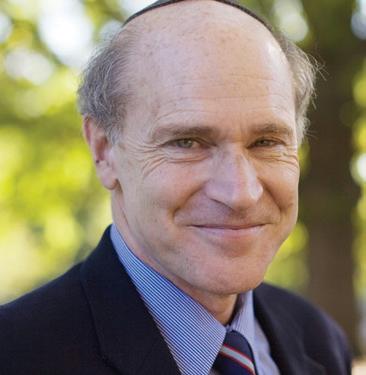
efforts by Jewish and Christian theologians to address moments of crisis in human reasoning: for example, when thinkers contradict themselves when trying to measure the infinite or comprehend God within the limits of finite reasoning. He will examine Scripture- and tradition-based reasoning as
resources for repairing such crises, utilizing insights from quantum science and transcendental reasoning.
In addition to offering a course on Muslim-Jewish-Christian Scriptural Reasoning, he will organize a conference, “Reasoning Beyond the Bounds of Clear Thinking,” which will explore practices of nonfinite reasoning in Judaism, Christianity, Islam, and post-Newtonian science.
“I anticipate my arrival at Boston College with great joy,” said Ochs. “In my long career of Christian-Jewish dialogue, this is my first opportunity to work directly with colleagues in Christian and Jewish Studies—on both the practice and theory of how to study scripture across different traditions, and I am eager to meet BC students and explore Abrahamic Scriptural reasoning with them.”
Ochs holds bachelor’s and doctoral degrees from Yale University and master’s degree from the Jewish Theological Seminary. “We are thrilled to be welcoming Dr. Peter Ochs as our next Corcoran Visit-
ing Professor,” said Daniel Joslyn-Siemiatkoski, director of the Center for ChristianJewish Learning. “Dr. Ochs’ proposed research project on examining how forms of reasoning in Jewish, Christian, and scientific modes can work towards repairing broken aspects of shared religious and social life is a fitting one for the mission of the center.”
Ochs’ first public event will be a webinar presentation outlining his proposed project in September.
Launched in 2000, the Center for Christian-Jewish Learning at Boston College is dedicated to the growth of new and mutually enriching relationships between Christians and Jews. The center applies the scholarly resources of a Catholic university to the task of encouraging mutual knowledge between Christians and Jews at every level. The center website is bc.edu/bc-web/ centers/Center-for-Christian-Jewish-Learning.html.
—University Communications
April 25, 2024
Peter Ochs
Associate Professor of Physics Cyril Opeil, S.J.
photo by lee pellegrini
4 Chronicle
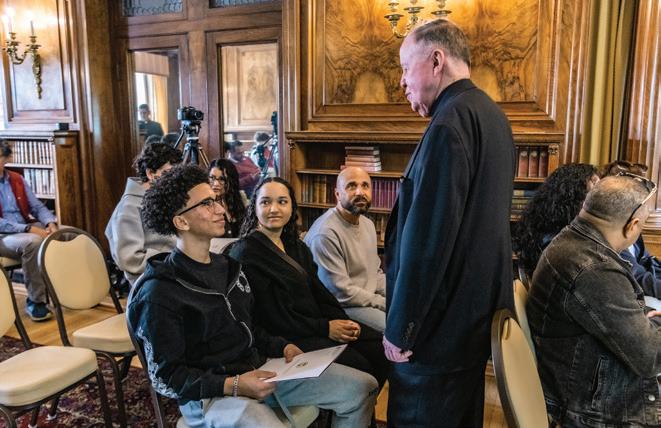
BC-Trinity Event Looks at Forced Migration Issues
BY SEAN SMITH CHRONICLE EDITOR
At a time when the number of forcibly displaced people worldwide has reached unprecedented levels, the Boston College School of Social Work’s Research Program on Children and Adversity (RPCA) and the Trinity College Dublin Centre for Forced Migration Studies will hold a symposium next month in Dublin to discuss the spectrum of resources and services necessary to aid such populations in remaking their lives.
City Connects Expands to Ireland
Continued from page 1
schools across nine states. The program integrates education with existing social services, youth development, health, and mental health resources. Numerous studies published in top-tier journals have demonstrated that City Connects schools produce dramatic improvement in their students’ grades, standardized test scores and longterm academic success.
Since 2019, BC and Mary Immaculate College (MIC) have been collaborating on the acculturation and implementation of City Connects within the Irish context. City Connects has been piloted since the 2020-2021 academic year in 10 of Dublin’s North-East Inner City primary schools. These schools are part of the national Delivering Equality of Opportunity in Schools (DEIS) program, which serves students who are designated as being at risk of educational disadvantage and social exclusion.
“NCCCI’s launch is the culmination of five years of piloting, testing, and refining the City Connects model,” said Walsh, the City Connects executive director. “The Irish educational community widely acknowledges the program’s success in providing every student a tailored plan of services and enrichments to address the student’s needs, strengths, and interests. We are delighted to share this approach to ‘whole child education,’ and to bring it to bear on poverty’s impact within Ireland’s high performing school system.
“Doing this work in partnership with MIC and the government of Ireland has been a source of deep learning for BC,” said Walsh, a Lynch School professor emerita and the daughter of Irish immigrants. She also serves as a senior fellow and founding director of the Mary E. Walsh Center for Thriving Children at the Lynch School.
NCCCI will be located within MIC’s Curriculum Development Unit, and the program’s rollout has already begun in Dublin’s North-East Inner City schools. The overall goal, subject to government funding, is to expand to other high-poverty sites in Ireland.
“We believe that City Connects holds
the potential to enhance the DEIS’s scheme through building on existing successes and supports and increasing their effectiveness through collaboration and partnership,” said Eucharia McCarthy, Curriculum Development Unit director. “City Connects offers an evidence-based strategic, systematic, and systemic response to the need to support children to flourish, learn, and live happy lives. These outcomes for children strongly echo the aspirations of the 2022 European Union Child Guarantee: Ireland’s National Action Plan.”
MIC, founded in 1898, is a coeducational Catholic college that serves nearly 5,000 undergraduate and postgraduate students on two campuses. MIC consistently educates 40 percent of Ireland’s elementary school teachers. Like BC, the college seeks to foster in its students a spirit of justice and compassion in the service of others, grounded in the vision of the Catholic Sisters of Mercy who believe that all individuals, and particularly the most marginalized, are entitled to an education.
According to MIC President Eugene Wall, City Connects offers a structured way to support an integrated model, enabling services to respond appropriately, efficiently, and cost effectively, thereby enhancing the life chances of every child.
“The strong alignment of vision and shared commitment of BC and MIC—together with the support of the Irish government—to make a positive difference in children’s lives has culminated in this vibrant, transatlantic partnership.”
“We are thrilled about the launch of the new City Connects center at Mary Immaculate College,” said Stanton E.F. Wortham, the Charles F. Donovan, S.J., dean of the Lynch School. “Our partnership with MIC colleagues, and with Irish educators and policymakers, has been very productive. The program has proven itself to be both cost-effective and highly successful at achieving academic and whole person outcomes for students in challenging circumstances. It’s wonderful to see this excellent intervention make a difference for young people in Ireland as well as in the United States.”
“Bridging the Humanitarian, Peacebuilding, and Development Nexus: Building Systems for Mental Health and Psychosocial Support (MHPSS) for Populations Affected by War, Forced Displacement, and Resettlement through an Implementation Science Lens,” which takes place May 7 and 8, will feature in-person panel sessions focused on implementation science, MHPSS, and bridging the relief-todevelopment gap in post-conflict settings from key research institutions, community organizations, and international stakeholders such as UNICEF and United Nations High Commissioner for Refugees (UNHCR).
As of mid-2023, UNHCR estimated that, for the first time in recorded history, more than 110 million people have been forcibly displaced—as a result of persecution, conflict, violence, human rights violations, or events seriously disturbing public order—and among them are more than 36.4 million refugees.
With that backdrop, next month’s symposium will gather expertise from multiple organizations and disciplines, including Boston College and Trinity College Dublin faculty and students. BCSSW Dean Gautam Yadama will present opening remarks and BCSSW faculty and staff members María Piñeros-Leaño, William Byansi, Candace J. Black, Thomas Crea, Maryanne Loughry, and Theresa Betancourt will be among the speakers and moderators. In addition, BC graduate students Abygail Meeks, Zina Aghdasi, Barbara Kozee, and Megan Taylor and undergraduate Samiksh Jain ’26 will serve as moderators and panelists highlighting their interest and career paths related to social work, nursing, theology, and international relations.
Wietse A. Tol, a professor in global mental health at the University of Copenhagen, and Washington University in St. Louis Vice Provost for Interdisciplinary Initiatives Mary McKay will be the keynote speakers. Another highlight will be the four panels: “The Problem of the Reliefto-Development Gap,” “Bridging the Gap: How Can the Humanitarian Response Set Up Possibilities of Future MPHSS Systems Being Built,” “Lived Experience and Participatory Research Approaches,” and “Implementation Science and Scaling Globally.”
The symposium is the latest outgrowth of the BC-Trinity partnership, which after numerous small-scale collaborations over the years was formalized with a Memoran-
dum of Understanding last summer. This event reflects the complementary expertise of RPCA and the Centre for Forced Migration Studies: RPCA utilizes observational research to understand trajectories of risk and resilience in children facing multiple forms of adversity while also using these research outcomes to develop and test evidence-based interventions to promote child health, development, and family functioning; the Centre for Forced Migration Studies, established in 2022, seeks to foster interdisciplinary and multidisciplinary research, develop teaching and training for individuals and organizations supporting refugees, and establish volunteer networks to help individuals who have been forced to migrate.

Salem Professor in Global Practice Theresa Betancourt, the RPCA director, said the symposium is an opportunity for social work and related fields to consider how best to bridge the “triple nexus” between humanitarian response, peacebuilding, and development actions in dealing with largescale crises.
“Given the issues with forced migration and armed conflict around the world, we are all the more obligated to respond with evidence and bring the tools of disciplines—like implementation science—to strengthen systems holistically, so that we can plan for the long term, even while responding to acute crises caused by instability that affects the lives of children, youth, and families,” said Betancourt, who spoke at the Centre for Forced Migration Studies launch. “By pushing the field in this direction, societies can respond more effectively and sustainably as they consider how they can build back better and develop systems needed for their citizens’ mental health, as well as social service needs for communities and generations to come.”
BC’s Institute for the Liberal Arts is a co-sponsor of the symposium. For more about the event, see bit.ly/RPCA-CFMSsymposium-2024.
April 25, 2024
University President William P. Leahy, S.J., visited with incoming Messina College students and their families prior to his welcome address at the second Admitted Eagles Day on April 13. Messina College, Boston College’s two-year program, will welcome its first class in July.
photo by lee pellegrini
Salem Professor in Global Practice Theresa Betancourt: Responses to crises must also include planning “for the long term.”
5 Chronicle
photo by lee pellegrini
Hale and Landy Stand Up for the Constitution
Continued from page 1
stance of the Constitution, they want to change it, or just get rid of it. The problem is, they have nothing to substitute for it.”
Critics of the Constitution, said Landy, often blame it for “things that are not a result, or the fault, of the Constitution”— namely the problems inherent in a modern state: size, diversity, and the need for a common, national defense.
Keeping the Republic is the first book co-authored by Hale and Landy, who have collaborated as editors on two volumes of essays as well as articles for Real Clear Politics/Public Affairs and The Claremont Review of Books. Friends since their undergraduate years at Oberlin College (“We’ve been in each other’s hair ever since,” as Landy puts it), the pair joined the Boston College faculty within three years of each other in the 1970s. To watch them converse is to see two people whose differing sociopolitical views—Landy tracks to the left of Hale—don’t lessen their obvious mutual respect for one another, or their ability to hold civil conversations and find common ground.
Although they have been in the same department for decades, say Hale and Landy, their writing partnership didn’t truly coalesce until they wound up in adjoining offices several years ago. When a raft of Constitutional criticism flowered from within academia and the media, the two began talking about it, then decided to write about it.
“We sat in Dennis’s office: I would talk and he would type,” recalled Landy, characterizing their co-authorship as a “Rodgers and Hammerstein” type of collaboration.
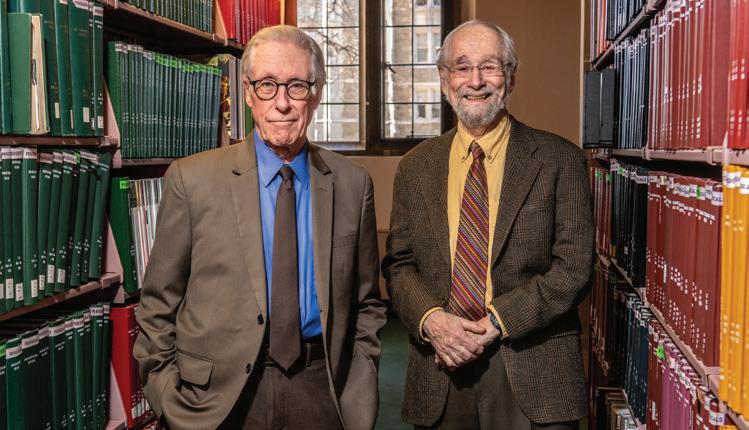
Landy and Hale include a clarification and a caveat early on in Keeping the Republic: Although their book is not an attempt to investigate every potential threat to the constitutional order, they acknowledge an existential one posed by Donald Trump, as reflected by his continual overstatement of his powers while president and his refusal to accept the 2020 election results. However, they argue that his presence in American politics is the end-product of numerous attempts down through U.S. history—including some from what would be considered a liberal/progressive standpoint—to circumvent or lessen constitutional oversight.
Setting a context for this historical retrospective, Hale and Landy analyze the con-
cept of modernity and how it applied to the age and milieu in which the framers of the Constitution lived. Influenced by philosophers like Hobbes, Locke, Montesquieu, and Hume, the framers were “at once ambitious and realistic,” the authors write: “They accepted human beings as they were and sought to construct a political framework for a modern republic grounded in human nature, considering both its strengths and weaknesses—paying special attention to the particular strengths and weaknesses of Americans.”
The key to the Constitution, say Landy and Hale, is that it establishes a republic, not a democracy—perhaps an underappreciated nuance but an important one, in that
a republic guards individual rights against the will of the majority.
“The Constitution creates a government meant to be balanced but intentional in its parts,” explained Hale. “In a republic, you need more than a simple majority to get things done. The Constitution builds incentive to reach and broaden coalitions.”
For much of the 21st century, as American politics have become ever more polarized, the capacity—and even the willingness—for opposing parties to compromise has waned, to the extent that Congress has become merely an arena for partisan bickering and virtue signaling, said Hale and Landy.
Rather than prescribe specific solutions, Landy and Hale devote the book’s final chapter to “thinking constitutionally”—a recommendation that citizens attain a true understanding of the Constitution and its aims, which is to foster liberty, justice, equality, prosperity, security, and civic comity. This means taking a long view, they explain, and realizing that what may have been regarded as landmark political achievements, such as the New Deal or the Great Society, ultimately contributed to the diminution of the Constitution, and America’s ability to effectively govern itself.
“We didn’t have to become the most powerful nation on Earth after World War II, but that’s how it turned out,” said Hale. “Obviously, achieving that status brings a unique set of political, social, and other challenges, and as a country we’ve struggled with these. But ultimately, the Constitution is the best safeguard against making choices we’d come to regret.”
BC Law’s EL-T Practicum Highlighted at Major Forum
BY PHIL GLOUDEMANS STAFF WRITER
An innovative environmental law teaching (EL-T) practicum created by a Boston College Law School faculty member was the subject of a discussion last month at the environmental law field’s most prominent event.
BC Law Professor Emeritus Zygmunt Plater was among the panelists at the 42nd annual Public Interest Environmental Law Conference (PIELC) held in Eugene, Ore., who gave a presentation on EL-T, in which third-year law students co-teach an undergraduate course in environmental law. Plater, who created the seminar-based program in 1972 while at University of Michigan Law School and introduced it at BC Law in 1991, was joined by six law student instructors and an administrator currently participating in the EL-T program.
“Environmental law offers an astonishingly broad scope of relevant material,” said Plater, who credits his late Michigan Law colleague Joseph Sax for EL-T’s inspiration. “The course can include subject matter from pollution and nuclear issues to parks, wildlife, urban lead poisoning, racial and demographic environmental injustices, wetlands, and climate. The field

also covers virtually the entire legal spectrum—from tort law and other common law remedies—to statutory, regulatory, and constitutional issues of every shape and size in public and private law.”
According to Plater, more than 250 BC Law students have co-taught the threecredit Environmental Law and Policy course to more than 3,500 BC undergraduates. In addition to the University of
Michigan, undergraduates from the University of Tennessee, Wayne State University, Southern Maine University, University of South Florida, St. Petersburg College, and Maine’s St. Joseph College have benefited from the course that Plater characterized as “globally relevant and eagerly valued by the participating institutions.”
He noted that while each teaching team’s iteration of an EL-T course reflects their respective interests, emphases and themes, all course syllabi are required to provide students with an initial practical working understanding of common law torts—the foundation of environmental law—and a fundamental awareness of how legal mechanisms in courts and agencies receive and process the complicated facts brought into the legal process.
Those who teach in the EL-T program, he said, gain “multidimensional, lifelong communication skills to effectively transmit complex facts and problem-solving analysis,” whether in the courtroom or any complex negotiation, and obtain “a deeper knowledge of environmental protection law and governance, because teaching the topic always requires much more extensive research and preparation than one would perform as a student.”
Participating EL-T undergraduates
typically major in environmental, biology, chemistry, public health, business, engineering, or pre-law concentrations, explained Plater, who characterized the course as a “powerful entry into the challenges of living in a complex society, and the modern legal process within our environmental protection laws.”
Royal Gardner J.D.’88, a professor at Stetson University College of Law—who participated virtually in the panel—said the program has been a benefit to him. “The preparation course helps me reflect more deeply on my own teaching. EL-T is a brilliant idea, and an excellent opportunity for law students to get more engaged with the material.”
“I fell in love with environmental law as a student in the teaching program, where I learned how citizens can reclaim their power, and join in the fight for environmental justice and protection,” said Goodwin Proctor LLP Associate Katherine Minorini ’20, J.D.’23. “Then, as an instructor, I helped inspire the next generation of environmental and public health advocates.”
Plater noted that several U.S. law schools are currently considering adopting EL-T, as well as the University of Victoria Faculty of Law in British Columbia, and law schools in Egypt and Nigeria.
April 25, 2024
Marc Landy, right, says authoring Keeping the Republic with longtime colleague Dennis Hale was a “Rodgers and Hammerstein” type of collaboration.
BC Law Professor Emeritus Zygmunt Plater
photo by suzanne camarata
6 Chronicle
photo by lee pellegrini
An Honor That Hits Home for BC Physics Professor
BY ED HAYWARD STAFF WRITER
Professor of Physics Ilija Zeljkovic was recently honored in his native Serbia with the Marko Jarić Award, sometimes referred to as the “Serbian Nobel for Physics,” for his research into novel materials.
Zeljkovic received the award from the Marko V. Jarić Foundation, in collaboration with the Serbian Institute of Physics, at a March 14 ceremony at the Serbian Academy of Sciences and Arts in Belgrade. Awarded for the past 25 years, the prize honors native Serbian scientists in honor of the late physicist.
The jury citation recognized Zeljkovic “for outstanding contributions to the study of highly correlated superconducting materials based on cuprates and crystal topological insulators, as well as to the study of superconductors with the Kagome crystal lattice.”
Following the formal award ceremony, Zeljkovic delivered remarks to a public audience and discussed his research with his peers at the Institute for Physics in Belgrade.
Zeljkovic, who came to Boston College as a postdoctoral researcher, joined the faculty in 2015, and was named a full professor last year, said the award holds a special significance.
“I am honored to receive the Marko Jarić Award. In some ways, this award completes a full circle in my professional life. I left Serbia after high school, as a student who aspired to become a scientist. Twenty years later, I am recognized for my accomplishments as a physicist in my native country. I am happy to see that my research ‘crossed’ borders and has been noticed by my colleagues in Serbia.”
The Serbian community of condensed matter physicists and scientists in the United States is close knit, Zeljkovic said, and even younger scientists are aware of Jarić’s work, conducted at Texas A&M University, where he was a tenured professor.
“Although his career was cut short by illness, Professor Jarić made a number of impactful scientific contributions,” Zeljkovic said. “The award I received was created more than 25 years ago in memory of his accomplishments, and also to recognize accomplishments of physicists in Serbia and physicists of Serbian descent abroad. Although it can be given for all areas of physics, my experimental research direction in condensed matter physics is coincidentally closely aligned with some of the topics Professor Jarić explored theoretically.”
After graduating from the Mathematics High School in Belgrade, Zeljkovic earned

Ilija Zeljkovic: “In some ways, this award completes a full circle in my professional life. I left Serbia after high school, as a student who aspired to become a scientist. Twenty years later, I am recognized for my accomplishments as a physicist in my native country.”
a bachelor’s degree at Washington University in St. Louis and a doctorate at Harvard University. His research into new frontiers in materials science has been published in leading peer-reviewed journals, including Science and Nature
The Zeljkovic Lab at BC explores the synthesis of new materials and research using scanning tunneling microscopy. A particular focus are cuprate-based superconductors, iron-based superconductors, and superconductors with the Kagome crystal structure.
Zeljkovic said his research could not have advanced without the support of the University and his colleagues in the Department of Physics. His work has been supported by several leading U.S. agencies, including the Department of Energy, National Science Foundation, Army Research Office, and Defense Advanced Research Projects Agency.
“The startup funds from BC enabled purchasing state-of-the-art instruments and performing our first experiments in the lab,” said Zeljkovic. “Grants from the DOE, NSF, ARO, and DARPA provided immense additional opportunities for new projects—purchasing new equipment, acquiring materials, and providing student support. Much of the work we performed in the past nine years here would not have been possible without the support of BC and these federal agencies.”
Eric C. Dearing, executive director of the Mary E. Walsh Center for Thriving Children (CTC), and a professor in the Counseling, Developmental & Educational Psychology department of the Lynch School of Education and Human Development, will receive an honorary degree from the University of Oslo (UO) at commencement ceremonies in September. From 2013-2018, Dearing served as a senior researcher at UO’s Norwegian Center for Child Behavioral Development; since 2018, he has been a visiting professor at the university’s Faculty of Educational Sciences. He has contributed to numerous research studies on child development with colleagues from UO.
Dearing joined the BC faculty in 2006, and succeeded CTC founder and Professor Emerita Mary E. Walsh in 2022. An expert in the links between students’ lives outside of school and their classroom performance, Dearing’s recent work focuses on promoting high-quality parent and early educator engagement to improve math learning for children from low-income families.
Associate Professor of Theology Mary Ann Hinsdale, I.H.M., is the recipient of the 2024 Yves Congar Award for Theological Excellence, presented annually by Barry University in Miami to recognize the contributions of contemporary theologians working, writing, and teaching in the Catholic tradition, and spurring that tradition to meet the challenges of today. Other Boston College theologians who have received the honor include the late Richard Gaillardetz, Lisa Sowle Cahill, M.
Jobs
The following are among the recent positions posted by the Department of Human Resources. For more information on employment opportunities at Boston College, see www.bc.edu/jobs or scan the QR code at right.
Service Center Representative
Senior Unix Systems Administrator
Fiscal & Procurement Specialist
Temporary Office Pool
Food Service Worker
Fiscal and Events Specialist
Public Safety Dispatcher
Assistant Director, Spiritual Formation
Academic Support Assistant
Concert Manager
Dishwasher
Assistant Director, Engineering Instructional Labs
Director, Human Neuroscience Facility
Patrol Officer
Shawn Copeland, and Roberto Goizueta.
A member of the Sisters, Servants of the Immaculate Heart of Mary, Sr. Hinsdale has taught in the Theology Department since 2000. Her areas of teaching and research focus on theological anthropology, ecclesiology, and feminist and ecological theologies. She is a former president of the Catholic Theological Society of America and author of the book Women Shaping Theology
In conjunction with the April 15 award presentation, Sr. Hinsdale delivered the lecture “Synodality: Pitfalls and Promises of a New Moment in the Catholic Church.”
Marina Bers, the Augustus Long Professor of Education in the Lynch School of Education and Human Development, has been selected to receive a Dame of the Imperial Hispanic Order of Charles V at the Solemn Ceremony of Knights in Granada, Spain. The damehood ceremony, equivalent to knighthood, recognizes individuals in the arts and sciences whose work has contributed to the country of Spain.
A native of Argentina, Bers is a widely recognized innovator in computer science education for early childhood, particularly for her Coding as Another Language curriculum—for both the free ScratchJr app she co-created and the KIBO robotics kit she developed—which has been translated into Spanish and is widely used across Spain and Latin America. There are more than 52 million users world-wide.
The damehood ceremony for Bers will take place on May 11.

Associate Director, Student Financial Systems
Assistant Director, Graduate Recruitment & Admissions, Lynch School
Consulting Dietician, Pediatrics
Housing Assignments Specialist
Area Coordinator, Office of Residential Life
Assistant/Senior Assistant/Associate Director, Undergraduate Admission Report Developer
Director, Sponsored Programs
Postdoctoral Research Fellow (multiple positions)
April 25, 2024
photo by lee pellegrini
7 Chronicle
Nota Bene
BC Arts
Shrayer Publishes a Book of ‘Confessional and Self-Revealing’ Poetry
BY ROSANNE PELLEGRINI STAFF WRITER
Kinship, a new English-language poetry collection by bilingual author and Boston College Professor Maxim D. Shrayer, weaves together some of the principal themes in modern Jewish history, exploring such topics as ancestry in Eastern Europe, the Shoah, antisemitism, the refusenik experience, exile, displacement and immigration, and Zionism and Israel.
“Kinship is a pained and inspiring meditation on writing between languages and cultures,” the publisher, Finishing Line Press, notes of the 33-poem collection, which is out this month. “Shrayer’s richly orchestrated and formally elegant verse captures with poignancy and passion what it feels like to be a Jewish poet with Soviet roots, living in America during Russia’s brutal war in Ukraine.”
A double launch will be held on April 30 at Burns Library Fine Print Room to celebrate the publication of Kinship as well as Chanties: An American Dream, a poetry chapbook by Professor of English Eric Weiskott. The free, public event will feature author readings, book signings, and a Passover-friendly reception. [See separate story]
Shrayer, a professor of Russian, English, and Jewish Studies who has authored and edited more than 25 books in English and Russian, said Kinship is his “quest to examine, through the lens of Jewish poetry, what is happening with the world. Its themes reflect both my personal history and my literary and academic interests.
“We’re living at a time of global wars and extreme polarization of the sociopolitical landscape, and thinking about it, cognizing it, and bearing witness to all of this via poetry felt both more organic and more constructive” than via literary prose, Shrayer added.
Poetry has taken center stage in Shrayer’s work since Russia’s invasion of Ukraine in
BC Scenes
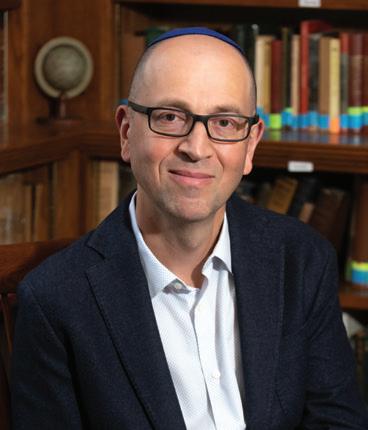
February 2022, he said. “Poetry tends to be a smaller form, often linked more obviously with social, political, and spiritual messaging, a form where textures and colors of the author’s identity reveal themselves more distinctly.”
Kinship opens with the title poem, an anti-war, anti-Putin text which is close to Shrayer’s personal story, and ends with “Homecoming,” a collective history of exile. Both have to do with the impossibility of return—for as long as a dictatorial regime rules Russia, according to the poet.
“There is room in our culture for more poetry that deals with the origins of some of today’s biggest conflicts. Among those who can shed light on them are translingual poets and Jewish poets who are rooted in two worlds. Poets who, like myself, came from the former Soviet Empire but have made a life in America—and also in the English language. One of my hopes for this collection is that it would help people connect a lot of the dots” about the war in Ukraine, explained Shrayer, whose family has deep roots there.

While some of the poems have political and historical dimensions, Shrayer doesn’t want Kinship to be considered a primarily political document. “It’s also a book of lyrical poems; they are confessional and selfrevealing, and that’s the best hope I have for poetry. In the post-October 7 climate of hostility to Israel, people will find in Kinship poems about things Jewish and Israeli that explore Israel as a beautiful, complex place.”
Shrayer is a third-generation author and poet’s son. Kinship is his sixth volume of poetry and second written in English, following Of Politics and Pandemics, published in 2020.
“Over the past three years I’ve been writing more poetry in English, especially more Jewish poetry in English. In part this comes from the realization that, when Russia invaded Ukraine, it was the end of my previous relationship with Russia,” he said. In addition to the Russian- to Englishlanguage transition, Shrayer’s poetry has
A Double Poetry Launch on April 30
In a fitting conclusion to National Poetry Month—which celebrates the importance of poets and poetry in our culture—an April 30 launch event at Burns Library will highlight recent poetry collections by Boston College faculty members Maxim D. Shrayer and Eric Weiskott.
During the event, which begins at 5 p.m. in the library’s Fine Print Room, Shrayer will read from his newly published Kinship, and Weiskott will read from Chanties: An American Dream. A reception and book signing will follow.
Associate University Librarian for Scholarly Resources and Burns Librarian Christian Dupont will serve as moderator, and Professors of English Andrew Sofer and Allison Adair—themselves authors of poetry collections—will introduce Shrayer and Weiskott, respectively.
A professor of Russian, English, and Jewish Studies, Shrayer was born in Moscow and emigrated in 1987. The author and editor of more than 25 books in English and Russian, he has published four collections of poetry in Russian, most recently Stikhi iz aipada (Poems from the iPad) and two collections in English, Of Politics and Pandemics and Kinship, which is out this month. [See separate story]
Weiskott, a professor of English who specializes in poetry, poetic meter, and periodization (the division of history into distinct periods), grew up in Greenport, NY, a small whaling village on the east end of Long Island. His poetry chapbook, Chanties: An American Dream “is a shipboard reverie about the American boat we’re all in. Prose poems, lists, and lyrics find their sea legs while musing on a photograph of a lover left on shore,” according to the publisher, Bottlecap Press.
A recent review of Chanties by Ocean Navigator cites Weiskott’s “clear observational style” and his being “well versed in songs
evolved in terms of structural changes: “A shift from the satirical to the lyrical, and from the persona of a Russian immigrant to that of a Jewish exile, and an increased attention to international politics and war politics. On the level of versification and prosody, I can specify a growing dependency on more expansive poetic forms.
“The poems in Kinship fluctuate between classical and nonclassical versification. My Russian roots are more closely aligned with classical versification because Russian poetry is more traditional than modern AngloAmerican poetry,” Shrayer explained. “In English, I incorporate classical forms, but also employ stanzaic forms and meters that are still foreigners or expatriates in English. In my shorter, non-classical poems you see more of the American, or the almost-American poet in me, of perhaps an ex-Soviet who is playing at being an American poet.”
For more about Maxim D. Shrayer and his work, see www.shrayer.com
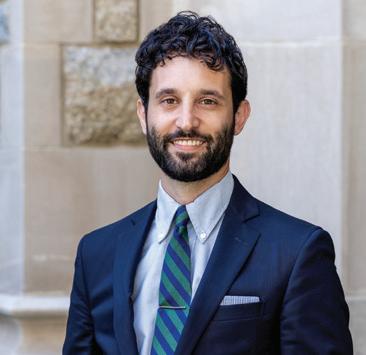
of the sea and the maritime imprint on our lives through literature.” The 21 poems “are written in free verse, yet the simplicity of the form belies the depth of the observations and the sly humor.”
A poet and scholar of poetry and poetics, Weiskott also authored the scholarly monograph Meter and Modernity in English Verse, 1350–1650. His poems have appeared in Fence, Texas Review, and Exacting Clam [Read the BC Bookmarks piece on Chanties at bcbookmarks.com/2023/09/12/24658]
“Chanties weaves together my interests in music, prose poetry, U.S. politics, literary history, and our collective experiences of living on this planet,” said Weiskott upon its publication. Of the April 30 event, he added: “I am excited to share poems from my recent chapbook with the BC community. [Professor of English] Suzanne Matson and so many other colleagues in the English Department have always been very supportive of my creative writing.”
The free, public event is sponsored by Boston College Libraries, the English and Eastern, Slavic, and German Studies departments, the East European and Eurasian Studies Program, and the Boston College Bookstore. More information is available at events.bc.edu.
—Rosanne Pellegrini
April 25, 2024
Maxim D. Shrayer
photo by lee pellegrini
Eric Weiskott
photo by caitlin cunningham
Members of the Boston College community—and one very tall visitor—enjoyed the festivities at the Mile 21 campus celebration on Patriot’s Day.
Standing Room
8 Chronicle
PHOTO BY SEHO LEE

















